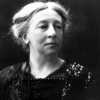Lady Gregory

Lady Gregory
Isabella Augusta, Lady Gregorywas an Irish dramatist, folklorist and theatre manager. With William Butler Yeats and Edward Martyn, she co-founded the Irish Literary Theatre and the Abbey Theatre, and wrote numerous short works for both companies. Lady Gregory produced a number of books of retellings of stories taken from Irish mythology. Born into a class that identified closely with British rule, her conversion to cultural nationalism, as evidenced by her writings, was emblematic of many of the political struggles to...
NationalityIrish
ProfessionDramatist
Date of Birth15 March 1852
CountryIreland
It is what the poets of Ireland used to be saying, that every brave man, good at fighting, and every man that could do great deeds and not be making much talk about them, was of the Sons of the Gael; and that every skilled man that had music and that did enchantments secretly, was of the Tuatha de Danaan.
From the sons of Ith, the first of the Gael to get his death in Ireland, there came in the after time Fathadh Canaan, that got the sway over the whole world from the rising to the setting sun, and that took hostages of the streams and the birds and the languages.
It was at Inver Slane, to the north of Leinster, the sons of Gaedhal of the Shining Armour, the Very Gentle, that were called afterwards the Sons of the Gael, made their first attempt to land in Ireland to avenge Ith, one of their race that had come there one time and had met with his death.
When I was a child and came with my elders to Galway for their salmon fishing in the river that rushes past the gaol, I used to look with awe at the window where men were hung, and the dark, closed gate.
It was in a stonecutter's house where I went to have a headstone made for Raftery's grave that I found a manuscript book of his poems, written out in the clear beautiful Irish characters.
It is not known, now, for what length of time the Tuatha de Danaan had the sway over Ireland, and it is likely it was a long time they had it, but they were put from it at last.
The Gaelic language itself depends very much on ear and rhythm, and when those who are thinking in Gaelic speak in English, they get the same rhythm.
When death comes, it is not enough to have been charitable; and it is not right to touch the body or lay it out for a couple of hours; for the soul should be given time to fight for itself, and to go up to judgment.
The Georges were fair; they left all to the Government; but Anne was very bad and a tyrant. She tyrannised over the Irish. She died broken-hearted with all the bad things that were going on about her. For Queen Anne was very wicked; oh, very wicked, indeed!
I really do not see why there is not a splendid field for good work on the music hall stage, and if I did not have my own theatre taking up my time, I should rather like to go into it.
I don't think Ireland has ever had a genius for the novel. Of course, there were plenty of Irish novels, but I don't think that was ever the natural means of expression for the Irish.
What makes Ireland inclined toward the drama is that it's a great country for conversation.
Napoleon the Third was not much. He died in England, and was buried in a country church-yard much the same as Kiltartan. But Napoleon the First was a great man; it was given out of him there never would be so great a man again.
It was in a mist the Tuatha de Danaan, the people of the gods of Dana, or as some called them, the Men of Dea, came through the air and the high air to Ireland.